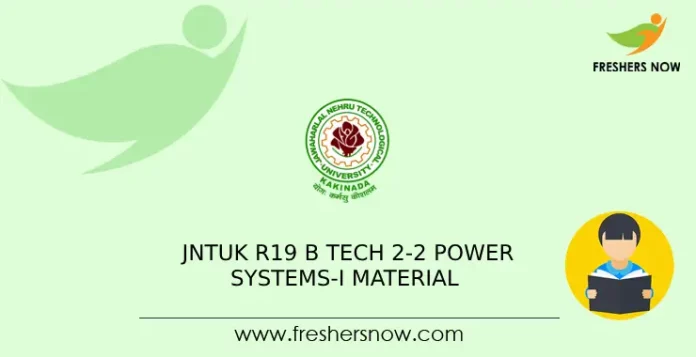
JNTUK R19 B.Tech EEE 2-2 Power Systems-I Material/ Notes PDF Download: Welcome to the comprehensive resource for JNTUK R19 B.Tech 2-2 Power Systems-I Notes, tailored to meet the needs of B.Tech EEE students enrolled in the JNTUK R19 curriculum. Our material encompasses a thorough exploration of key topics essential for understanding power systems. Delve into the intricate workings of thermal power stations, gaining insights into the operation of various components. Unravel the complexities of nuclear power stations, understanding their principles of operation in detail. Download our JNTUK R19 B.Tech EEE 2-2 Power Systems-I Material/ Notes PDF for a comprehensive learning experience.
JNTUK R19 B.Tech 2-2 Power Systems-I – Units
| No. Of Units | Name of the Unit |
| Unit – 1 | Thermal Power Stations |
| Unit – 2 | Nuclear Power Stations |
| Unit – 3 | Substations Classification of substations, Gas Insulated Substations |
| Unit – 4 | Underground Cables |
| Unit – 5 | Economic Aspects of Power Generation & Tariff |
Unit 1 Syllabus PDF Download | JNTUK R19 B.Tech 2-2 Power Systems-I Material
Thermal Power Stations Selection of site, the general layout of a thermal power plant showing paths of coal, steam, water, air, ash and flue gasses, ash handling system, Brief description of components: boilers, superheaters, economizers, electrostatic precipitators, steam turbines: impulse and reaction turbines, condensers, feed water circuit, cooling towers, and chimney.
| JNTUK R19 B.Tech Power Systems-I Material – PDF Download | |
| To Download JNTUK R19 B.Tech Power Systems I Unit – 1 Notes PDF | Download PDF |
Unit 2 Syllabus PDF Download | JNTUK R19 B.Tech 2-2 Power Systems-I Material
Nuclear Power Stations Location of the nuclear power plant, working principle, nuclear fission, nuclear fuels, nuclear chain reaction, nuclear reactor components: moderators, control rods, reflectors and coolants, types of nuclear reactors, and a brief description of PWR, BWR, and FBR. Radiation: radiation hazards and shielding, nuclear waste disposal.
| JNTUK R19 B.Tech Power Systems-I Material – PDF Download | |
| To Download JNTUK R19 B.Tech Power Systems-I Unit – 2 Notes PDF | Download PDF |
Unit 3 Syllabus PDF Download | JNTUK R19 B.Tech 2-2 Power Systems-I Material
Substations Classification of Substations: Air Insulated Substations – indoor & outdoor substations, substations layouts of 33/11 kV showing the location of all the substation equipment. Bus bar arrangements in the sub-stations: simple arrangements like single bus bar, sectionalized single bus bar, double bus bar with one and two circuit breakers, and main and transfer bus bar system with relevant diagrams.
Gas Insulated Substations (GIS) – Advantages of gas insulated substations, different types of gas insulated substations, single line diagram of gas insulated substations, constructional aspects of GIS, installation, and maintenance of GIS, comparison of air insulated substations and gas insulated substations.
| JNTUK R19 B.Tech Power Systems-I Material – PDF Download | |
| To Download JNTUK R19 B.Tech Power Systems-I Unit – 3 Notes PDF | Download PDF |
Unit 4 Syllabus PDF Download | JNTUK R19 B.Tech 2-2 Power Systems-I Material
Underground Cables Types of cables, construction, types of insulating materials, calculation of insulation resistance, stress in insulation, and power factor of cable. The capacitance of single and 3-Core belted Cables: Grading of cables – capacitance grading and inter sheath grading.
| JNTUK R19 B.Tech Power Systems-I Material – PDF Download | |
| To Download JNTUK R19 B.Tech Power Systems-I Unit – 4 Notes PDF | Download PDF |
Unit 5 Syllabus PDF Download | JNTUK R19 B.Tech 2-2 Power Systems-I Material
Economic Aspects of Power Generation & Tariff Economic Aspects –load curve, load duration, and integrated load duration curves, discussion on economic aspects: connected load, maximum demand, demand factor, load factor, diversity factor, power capacity factor, and plant use factor, base and peak load plants. Tariff Methods– costs of generation and their division into fixed, semi-fixed, and running costs, desirable characteristics of a tariff method, tariff methods: simple rate, flat rate, block-rate, two-part, three–part, and power factor tariff methods.
| JNTUK R19 B.Tech Power Systems-I Material – PDF Download | |
| To Download JNTUK R19 B.Tech Power Systems-I Unit – 5 Notes PDF | Download PDF |
JNTUK R19 B.Tech 2-2 Power Systems-I Notes – Outcomes
- Understanding Thermal Power Plants: Recognizing the components involved in converting fuel into electricity, such as boilers, turbines, generators, condensers, and systems for coal and ash handling.
- Understanding Nuclear Power Plants: Identifying the components crucial for harnessing nuclear energy safely, including reactor cores, control rods, steam generators, cooling systems, containment buildings, and fuel handling systems.
- Understanding Air and Gas Insulated Substations: Grasping the components essential for the efficient transmission and distribution of electricity, including circuit breakers, disconnect switches, busbars, insulators, and transformers.
- Differentiating Single Core and Three Core Cables: Distinguishing between cables based on their core configurations and insulation materials, which play vital roles in electrical conductivity and safety.
- Analyzing Economic Factors of Power Generation and Tariffs: Evaluating the financial aspects of power generation, including capital and operating costs, fuel expenses, regulatory compliance costs, and the determination of tariffs affecting consumer electricity prices.
For more details about JNTUK R19 B.Tech EEE Power Systems-I Material and other materials follow our official website Freshersnow.com.



